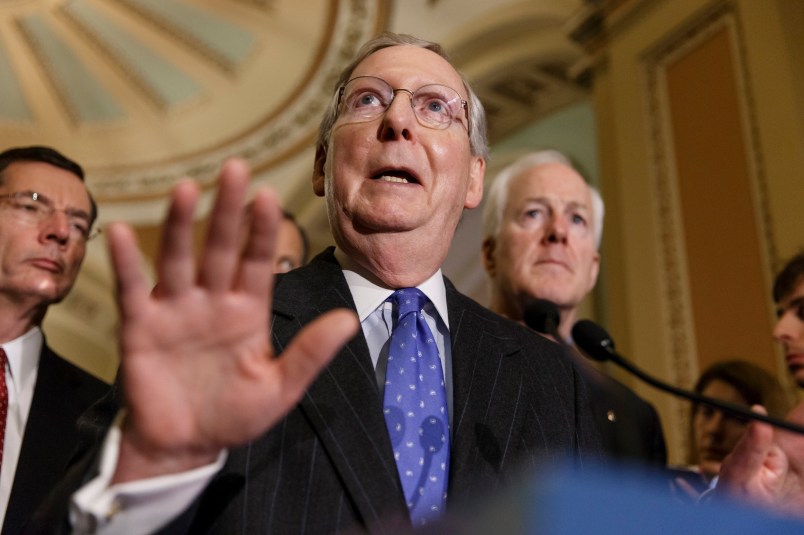Arguably the most significant consequence of a Republican Senate takeover in 2014 is absent from the campaign trail, and hardly registers in any polls asking Americans what their top election issues are.
It’s not Obamacare. It’s not taxes or spending or immigration. It’s not the ISIS terrorist threat.
It’s judicial and administrative nominations: who gets to be a lifetime-tenured federal judge, and who gets to run powerful government agencies.
Major legislation will remain bottled up under any plausible outcome in November as President Barack Obama will still hold the veto pen and Republicans will still control the House. But the Senate is the exclusive guardian of the nomination process. And in a potential Republican-led Senate, probable Majority Leader Mitch McConnell (KY) would have complete control over which of Obama’s nominations may come up for a confirmation vote.
“My guess is they put a stop to a host of nominations and try to use that process for hostage taking and leverage,” said Norm Ornstein, a congressional scholar at the American Enterprise Institute. “Certainly it means the ability of Obama to get any judicial nominations through becomes about zero.”
A total of 155 nominations for the executive and judicial branches are pending on the Senate floor, and there’s nowhere near enough time to confirm them all before the next Congress is sworn in. There are 50 vacancies on district courts and 7 vacancies in appeals courts, and more will open up. Senate Democrats have raced to confirm Obama’s judicial nominees since they eliminated the 60-vote threshold for non-Supreme Court nominations.
“Confirmation rates will certainly drop (perhaps plummet from their near 100% level of late), but Republicans will have some incentive to negotiate with the White House over acceptable nominees (particularly for judgeships in states with two GOP senators),” said Sarah Binder, a political science professor at George Washington University, in an email.
There would be some precedent for that — Sen. Harry Reid (D-NV) halted many of President George W. Bush’s judicial nominees after he became majority leader in January of 2007.

United States President Barack Obama, center, meets with Members of Congress including U.S. Senate Republican Leader Mitch McConnell (Republican of Kentucky), right, and U.S. Senate Majority Leader Harry Reid (Democrat of Nevada), left, in Cabinet Room of the White House in Washington, D.C., U.S., on Thursday, July 31, 2014. (AP Photo.)
A GOP Senate means Obama’s executive branch nominees could face major hurdles if McConnell or his members don’t like them. Some nominees may be nonstarters; others may be subject to negotiations with McConnell. You want that nominee? Give me this.
“That’s going to create a dilemma for Obama even on executive nominees,” said Ornstein. “Even for people he’d like to see leave, he will probably have to convince them to stay because there won’t be much of an opportunity to replace them. … It’s always tough in the final two years of an administration.”
The stakes rise enormously if a Supreme Court seat were to be vacated in Obama’s final two years. A Republican majority would have a big incentive to run out the clock on any Obama nominee and wait until after the 2016 election to confirm the next justice.
“A Republican Senate would complicate President Obama’s ability to fill a Supreme Court vacancy should one occur, and likely hinder him in winning confirmation of his chosen appellate court nominees,” said Judith Schaeffer, vice president of the Constitutional Accountability Center, a progressive legal advocacy group.
Progressive legal advocates worry that a McConnell-led Senate would spell problems for Obama to confirm his picks for judges.
“While the progressive base is not as fervent over the courts and judicial nominations as is the conservative base, Majority Leader Harry Reid has demonstrated his understanding of the importance of these matters, and has used the last two years to help bring about a dramatic reduction in the number of vacancies,” said Schaeffer. “Obviously, his power to continue in this direction would be drastically reduced if the Senate were to change hands.”
This article has been updated for clarity.







All these Republicans have skeletons in their closets. Their family members have skeletons in their closets. Their business associates have skeletons in their closets.
There are a lot of people out there with good, life-destroying information out there. Time to put it to good use.
History will judge this period of US Congressional politics as the ugliest since that of pre-Civil War days.
Men like Mitch better pray to whatever pig god he worships that there is no afterlife, because if there is he’ll spend his down in the 9th Ring of the Inferno where the most evil bastards get to spend eternity.
No, THIS specifically is what’s truly at stake in the battle for Senate control:
Ginsburg: Age 81, and in poor health
Scalia: Age 78, questionable mental state, poor physical condition
Kennedy: Age 78
Breyer: Age 76, said to be considering retirement
Thomas, Age 66 and scAlito, age 64: questionable sanity
Now, we can whistle past the graveyard and think Obama’s not going to have to worry about it…or we can hedge our bets by assuring that the Senate remains in Democratic hands.
Not sure if the Dems can “Man Up”, but I hope they can “Message Up”. They need to show the republicans for what they are; greedy, corporate and billionaire interests who don’t give a damn about race, health care, minorities, immigration, a minimum wage, housing, working conditions, social security, etc.
You want to win Dems? Stop running away and stand up to the GOTP bully.
No different than the last couple of Pres. elections…it has been about the S.C. for some time…and what a mess of a court we have now…part of the Bush Cheney legacy along with the Middle East